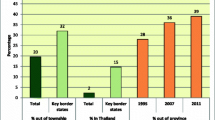Abstract
The article addresses the strength and character of intergenerational family solidarity under different family cultures and welfare state regimes in order to answer the following two questions: (1) Is intergenerational solidarity stronger under the more collectivist southern family tradition than under the more individualist northern tradition? (2) Is more generous access to social care services a risk or a resource for family care? These questions are explored with data from the OASIS project, a comparative study among the urban populations aged 25+ (n=6,106) in Norway, England, Germany, Spain, and Israel. The findings indicate that the welfare state has not crowded out the family in elder care, but has rather helped the generations establish more independent relationships. Intergenerational solidarity is substantial in both the northern and southern welfare state regimes, and seems to vary in character more than in strength.

Similar content being viewed by others
References
Bengtson VL, Roberts REL (1991) Intergenerational solidarity in aging families: an example of formal theory construction. J Marriage Fam 53:856–870
Daatland SO (1990) What are families for? On family solidarity and preferences for help. Ageing Soc 10:1–15
Daatland SO (1997) Family solidarity, popular opinion, and the elderly: perspectives from Norway. Ageing Int 1:51–62
Daatland SO, Herlofson K (2001) Ageing, intergenerational relations, care systems and quality of life. An introduction to the OASIS project. Oslo: NOVA, report 14–2001
Daatland SO, Herlofson K (2003) ‘Lost solidarity’ or ’changed solidarity’: a comparative European view of normative family solidarity. Ageing Soc 23:537–560
Daatland SO, Herlofson K (2004) Familie, velferdsstat og aldring. Familiesolidaritet i et europeisk perspektiv. Oslo: NOVA rapport 7–2004
Esping-Andersen G (1990) The three worlds of welfare capitalism. Princeton University Press, Princeton
Esping-Andersen G (1999) Social foundations of postindustrial economies. Oxford University Press, Oxford
Evers A (1988) The new long-term care insurance program in Germany. J Aging Soc Policy 10(1):77–98
Ferrera M (1996) The ‘southern model’ of welfare in social Europe. J Eur Soc Policy 6(1):17–37
Finch J, Mason J (1993) Negotiating family responsibilities. Tavistock/Routledge, London
Katan J, Lowenstein A (2001) Basing welfare services in a legal infra structure—implications of the Long-term Care Insurance Law. Gerontology 27(1):55–68
Kohli M (1999) Private and public transfers between generations: linking the family and the state. European Societies 1
Künemund H, Rein M (1999) There is more to receiving than needing: theoretical arguments and empirical explorations of crowding in and crowding out. Ageing Soc 19:93–121
Lee GR, Peek CW, Coward RT (1998) Race differences in filial responsibility expectations among older parents. J Marriage Fam 60:404–412
Lingsom S (1997) The substitution issue. Care policies and their consequences for family care. Oslo: NOVA, report 6–1997
Litwak E (1985) Helping the elderly: the complementary roles of informal networks and formal systems. Guilford Press, New York
Lowenstein A, Ogg J (eds) (2003) OASIS. Old age and autonomy: the role of service systems and intergenerational family solidarity. Final report. University of Haifa, Haifa
Lowenstein A, Katz R (2005) Living arrangements, family solidarity and life satisfaction of two generations of immigrants. Ageing Soc 25:1–19
Lüscher K, Pillemer K (1998) Intergenerational ambivalence: a new approach to the study of parent–child relations in later life. J Marriage Fam 60:413–425
Marshall VW, Matthews SH, Rosenthal CJ (1993) Elusiveness of family life: a challenge for the sociology of aging. In: Maddox GL, Lawton MP (eds) Annual review of gerontology and geriatrics: focus on kinship, aging and social change. Springer, New York
Millar J, Warman A (1996) Family obligations in Europe. Family Policy Studies Centre, London
Motel-Klingebiel A, Tesch-Römer C, von Kondratowitz H-J (2003) ‘The quantitative survey’. In: Lowenstein A, Ogg J (eds) OASIS old age and autonomy: the role of service systems and intergenerational family solidarity. Final report. University of Haifa, Haifa, pp 63–101
Reher DS (1998) Family ties in western Europe: persistent contrasts. Popul Dev Rev 24(2):203–234
Silverstein M, Bengtson VL (1997) Intergenerational solidarity and the structure of adult–child relationships in American families. Am J Soc 103(2):429–460
Sundström G (1994) Care by families: an overview of trends. In: Hennesy P (ed) Caring for frail elderly people in Europe. New directions in care. Paris: OECD, Social Policy Studies no 14, pp 15–55
UN (2002) World population ageing 1950–2050
von Kondratowitz HJ, Tesch-Römer C, Motel-Klingebiel A (2002) Establishing systems of care in Germany: a lpng and winding road. Aging Clin Exp Res 14(4):239–246
von Kondratowitz HJ (2003) Comparing welfare states. In: Lowenstein A, Ogg J (eds) OASIS old age and autonomy: the role of service systems and intergenerational family solidarity. Final report. University of Haifa, Haifa
Ware JE, Sherbourne CD (1992) The MOS 36-item short-form health survey (SF-36). Med Care 30(6):473–483
Wolfe A (1989) Whose keeper? Social science and moral obligations. University of California Press, Berkely
Author information
Authors and Affiliations
Corresponding author
Rights and permissions
About this article
Cite this article
Daatland, S.O., Lowenstein, A. Intergenerational solidarity and the family–welfare state balance. Eur J Ageing 2, 174–182 (2005). https://doi.org/10.1007/s10433-005-0001-1
Published:
Issue Date:
DOI: https://doi.org/10.1007/s10433-005-0001-1




